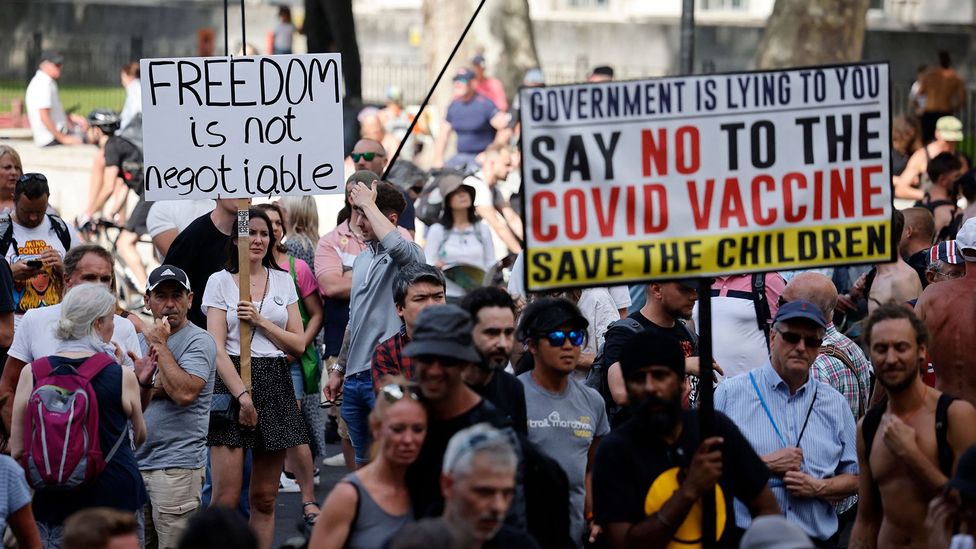Public Health Concerns: Anti-Vaxxer Heads Autism Study

Table of Contents
The Study's Methodology and Flaws
The purported study linking vaccines to autism suffers from several critical flaws that render its conclusions invalid and dangerous. These flaws undermine the scientific integrity of the research and contribute to the spread of misinformation about vaccine safety.
Lack of Peer Review and Scientific Rigor
A cornerstone of scientific validity is peer review – the process where experts in the field scrutinize a study before publication. This "Anti-Vaxxer Autism Study" notably lacks this crucial step, raising serious concerns about its reliability.
- Small sample size: Studies with small sample sizes are inherently less powerful and more prone to random error, making it difficult to draw reliable conclusions.
- Lack of control group: A proper scientific study requires a control group for comparison, allowing researchers to isolate the effects of the variable being studied. The absence of a control group makes it impossible to determine causality.
- Potential for bias: Studies conducted by researchers with pre-existing biases towards a particular outcome are susceptible to confirmation bias, leading to skewed results. The researchers' known anti-vaccine stance raises concerns about potential bias.
- Unverified data sources: Relying on anecdotal evidence or unverified data sources weakens the study's credibility significantly. Scientific research demands rigorous data collection and analysis using established methods.
Conflict of Interest and Funding
Transparency in research funding is paramount. The funding sources of this "Anti-Vaxxer Autism Study" must be carefully scrutinized for any potential conflicts of interest.
- Funding from anti-vaccine organizations: Studies funded by groups with a vested interest in promoting anti-vaccine narratives are inherently suspect. Such funding creates a clear conflict of interest and raises doubts about the study's objectivity.
- Researchers with known anti-vaccine stances: Researchers with publicly declared anti-vaccine beliefs are likely to interpret data in a way that supports their pre-existing biases, regardless of the actual findings. This compromises the integrity of the research process.
- Lack of transparency: A lack of transparency about funding sources and researchers' affiliations further erodes the study's credibility, fueling distrust in the findings.
Misinterpretation of Data and Statistical Errors
Even if data were collected properly, misinterpreting statistical analysis can lead to inaccurate conclusions. This "Anti-Vaxxer Autism Study" likely suffers from such flaws.
- Cherry-picked data: Selecting only data points that support a pre-determined conclusion while ignoring contradictory data is a form of statistical manipulation.
- Inappropriate statistical tests: Applying inappropriate statistical tests can distort the results and lead to false conclusions.
- Ignoring confounding factors: Failing to account for confounding factors – other variables that might influence the outcome – can lead to misleading interpretations. For example, genetic predisposition to autism is a significant confounding factor often ignored in these types of studies.
The Dangers of Vaccine Hesitancy and Misinformation
The consequences of vaccine hesitancy extend far beyond individual choices; they threaten public health at large.
Impact on Herd Immunity
High vaccination rates are crucial for achieving herd immunity, protecting vulnerable individuals who cannot be vaccinated.
- Resurgence of preventable diseases: Decreased vaccination rates have led to the resurgence of previously controlled diseases like measles, mumps, and whooping cough, endangering both unvaccinated children and those with compromised immune systems.
- Increased healthcare costs: Outbreaks of preventable diseases place a significant burden on healthcare systems, resulting in increased costs and strained resources.
- Risk to vulnerable populations: Individuals with weakened immune systems, such as those undergoing chemotherapy or with chronic illnesses, rely on herd immunity for protection. Low vaccination rates endanger these vulnerable populations.
The Spread of Misinformation Through Social Media
Anti-vaccine messages proliferate rapidly on social media platforms.
- Targeted advertising: Anti-vaccine groups use targeted advertising to reach specific demographics, spreading misinformation effectively.
- Echo chambers and filter bubbles: Social media algorithms often reinforce existing beliefs, creating echo chambers where misinformation is amplified and unchallenged.
- Lack of fact-checking and moderation: The lack of effective fact-checking and moderation on some platforms allows misleading content to spread unchecked.
The Importance of Reliable Sources and Scientific Consensus
It's crucial to rely on trustworthy sources of information about vaccines.
- CDC and WHO: The Centers for Disease Control and Prevention (CDC) and the World Health Organization (WHO) provide reliable, evidence-based information on vaccine safety and efficacy.
- Peer-reviewed journals: Scientific journals that undergo rigorous peer review are the gold standard for scientific information.
- Reputable healthcare professionals: Consult your doctor or other qualified healthcare professionals for personalized advice on vaccinations. The overwhelming scientific consensus supports the safety and effectiveness of vaccines.
Addressing Public Health Concerns and Promoting Vaccination
Combating vaccine hesitancy requires a multi-pronged approach.
The Role of Public Health Campaigns
Effective public health campaigns can educate the public and dispel myths.
- Targeted communication: Tailor communication strategies to specific demographics and address their concerns directly.
- Use of credible messengers: Engage trusted community leaders, healthcare professionals, and celebrities to promote vaccination.
- Clear and concise messaging: Avoid technical jargon and present information in a clear, accessible way.
The Importance of Collaboration Between Healthcare Professionals and the Public
Building trust between healthcare providers and the public is vital.
- Open and honest communication: Address concerns openly and honestly, acknowledging any potential side effects while emphasizing the benefits of vaccination.
- Empathetic approach: Listen to individuals' concerns and address them with empathy and understanding.
- Personalized communication: Provide personalized information and address specific concerns based on individual circumstances.
Conclusion
The "Anti-Vaxxer Autism Study" exemplifies the dangers of flawed research and the spread of misinformation. Its methodological weaknesses, lack of peer review, and potential for bias render its conclusions unreliable and harmful. Vaccine hesitancy poses a significant threat to public health, jeopardizing herd immunity and increasing the risk of preventable diseases. It is critical to rely on credible sources, such as the CDC and WHO, and to engage in critical thinking when encountering information about vaccines. We must all actively combat the spread of misinformation related to anti-vaxxer autism studies and promote evidence-based vaccination practices within our communities. Consult reliable sources for accurate information about vaccines and encourage vaccination to protect yourself, your family, and your community. Let's work together to debunk these myths and ensure a healthier future for everyone.

Featured Posts
-
 20
Apr 27, 2025
20
Apr 27, 2025 -
 Vancouver Whitecaps Stadium Future Pne Fairgrounds A Potential Location
Apr 27, 2025
Vancouver Whitecaps Stadium Future Pne Fairgrounds A Potential Location
Apr 27, 2025 -
 Canadas Divided Response To Trump Albertas Oil Industry And The National Narrative
Apr 27, 2025
Canadas Divided Response To Trump Albertas Oil Industry And The National Narrative
Apr 27, 2025 -
 How Microsoft Is Shaping The Future Of Ai With A Human First Approach
Apr 27, 2025
How Microsoft Is Shaping The Future Of Ai With A Human First Approach
Apr 27, 2025 -
 Camille Claudel Bronze 3 Million Auction Result In France
Apr 27, 2025
Camille Claudel Bronze 3 Million Auction Result In France
Apr 27, 2025
Latest Posts
-
 Ariana Biermanns Alaskan Trip A Couples Chill Adventure
Apr 27, 2025
Ariana Biermanns Alaskan Trip A Couples Chill Adventure
Apr 27, 2025 -
 Ariana Biermann And Boyfriend Enjoy Alaskan Escape
Apr 27, 2025
Ariana Biermann And Boyfriend Enjoy Alaskan Escape
Apr 27, 2025 -
 Ariana Biermanns Alaskan Adventure Romantic Getaway With Her Boyfriend
Apr 27, 2025
Ariana Biermanns Alaskan Adventure Romantic Getaway With Her Boyfriend
Apr 27, 2025 -
 Buy Ariana Grande Lovenote Fragrance Set Online A Complete Guide To Pricing And Retailers
Apr 27, 2025
Buy Ariana Grande Lovenote Fragrance Set Online A Complete Guide To Pricing And Retailers
Apr 27, 2025 -
 How To Buy Ariana Grandes Lovenote Fragrance Set Online Pricing And Availability
Apr 27, 2025
How To Buy Ariana Grandes Lovenote Fragrance Set Online Pricing And Availability
Apr 27, 2025
